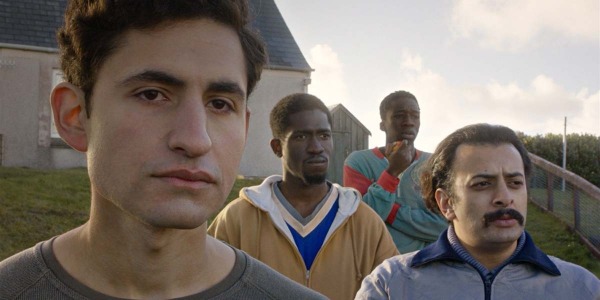“Cultural Awareness 101,” says the scrappy chalkboard as two eccentric figures dance their way through a sex lesson that widely resembles a Discovery Channel documentary on wild animal mating rituals. Their audience is a group of bewildered foreigners who have been bundled together into a classroom in the middle of the Scottish Outer Hebrides, the place they now unexpectedly call home.
A story through layers
Following his 2015 quirky festival-hit comedy Pikadero, Scottish director Ben Sharrock once again offers deliciously funny bits of dialogue intertwined with fleeting moments of sheer vulnerability. An exciting filmmaker, Sharrock’s dynamic direction is as layered as his portrait of the men, often seen gathered as they navigate the plethora of oddities that surround them, a reminder not only of the diversity of their stories but also of the weight of what they share.
A man and his oud
In a career-making role, Amir El-Masry’s poignant performance as Syrian musician Omar is breathtakingly precise. A young man who left a promising career and his beloved family behind in order to fight for survival, Omar carries his bulky oud case in hand everywhere he goes, a metaphorical gate to the life he once had. While tightly grasping the worn handles, the man carefully nurtures a fragile connection to a yesterday he wishes to maintain untarnished. Since becoming physically unable to play his treasured instrument due to a hand injury, Omar dwells on memories of happier days, bleakly staring at his phone screen while a younger version of himself plays to an eager audience.

“Do you ever think about who you were before all of this?”
“ I try not to”
“Would you go back if you could?”
“I can’t”
A contrast to reticent Omar, Farhad (Vikash Bhai) is a lively moustached man dripping with optimism. Together, the duo embodies the painful dichotomy of life as a refugee: the grief of what was lost and the hope of what is still to come. Underlying Farhad’s cheerfulness is a heavy burden he conceals with the help of Freddie Mercury and an unusual pet. Bhai’s magnetic screen presence finds its perfect counterpart in Masry’s enthralling countenance. When together, the duo is unrivalled.
A grammatically correct plea
“I used to be happy before I came here. I used to cry myself to sleep every night but now I don’t have any tears left” soberly declares one of the students during a lesson on the correct usage of “I used to”, a piercing cry for help answered by the cheerful clapping of a teacher proud of her student’s grammatical achievements. The scene, wittily outlandish yet deeply heartbreaking, perfectly encapsulates the nature of Sharrock’s marvellous sophomore feature.
Frightening in its portrait of sorrow yet far from pedantic in its exploration of asylum-seeking, Limbo is nothing short of sublime, a triumphant feat of storytelling as striking in its visuals as it is in its writing. Sharrock is unafraid to cut a deep wound, blowing lovingly into it and then cutting into it deeper, a steady, well-orchestrated cycle of small joys and gutwrenching woes. In a world of caustic headlines and harmful ignorance, Limbo is a biting glimpse into something most of us will hopefully only experience through a screen.
What are some of your favourite films on the subject of the refugee crisis? Tell us in the comments.
Limbo had its world premiere at the Toronto Film Festival 2020.
Watch Limbo
Does content like this matter to you?
Become a Member and support film journalism. Unlock access to all of Film Inquiry`s great articles. Join a community of like-minded readers who are passionate about cinema - get access to our private members Network, give back to independent filmmakers, and more.